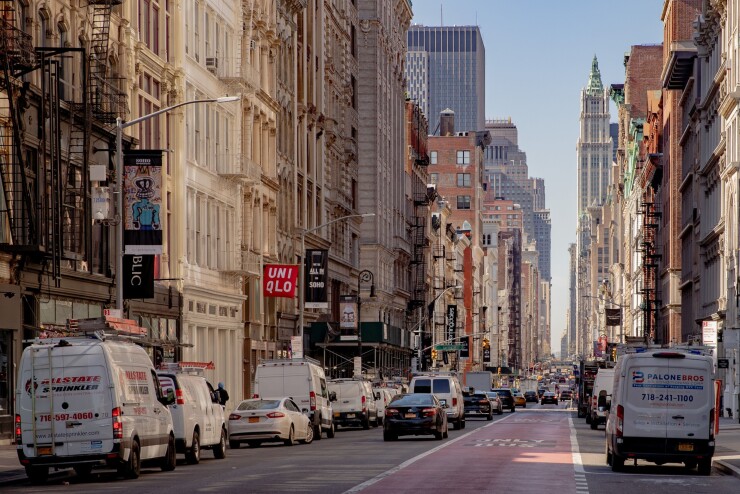The New York Metropolitan Transportation Authority Board voted 11-1 to adopt its congestion pricing toll structure, the first of its kind in the nation and a
The vote will allow congestion pricing to be implemented as planned in mid-June. However, the congestion pricing plan is battling several lawsuits in federal courts.
“Today’s vote is one of the most significant the board has ever undertaken, and the MTA is ready,” MTA Chair Janno Lieber said in a press release. “There’s more to come with the funds raised from congestion pricing — more accessible stations, modernized subway signals, and new expansion projects like Phase 2 of the Second Avenue Subway and Metro-North Penn Station Access.”
Bloomberg News
The congestion pricing plan was mostly unchanged from the plan put forward by the Traffic Mobility Review Board on Nov. 30. The MTA Board approved that plan, with a few clarifications, to go into public comment period on Dec. 6.
Since December, the MTA has received 25,600 written comments and held four town halls with 386 speakers. These comments had no effect on the toll structure, which will require most passenger vehicles and small commercial vehicles entering Manhattan’s Central Business District to pay $15. Motorcycles will be charged $7.50 and they will be charged no more than once a day. Trucks and some buses will be charged $24 or $36 depending on their size and function. All of these fees will be much lower at night, when there is less congestion.
Passengers in taxis will pay a $1.25 toll for every trip to, from, within or through the Central Business District, and customers in “app-based for-hire vehicles” will pay $2.50. There are discounts for low-income Manhattan residents and exemptions for certain emergency vehicles, school buses and people with disabilities.
Congestion pricing proponents claim it will reduce gridlock, improve air quality in Manhattan and boost ridership on the MTA, which has never recovered its pre-pandemic ridership levels.
“Congestion pricing will ease traffic, cut carbon emissions, and provide our beleaguered transit system with the resources it needs to modernize signals, boost accessibility, and serve more riders,” New York City Comptroller Brad Lander said in a statement celebrating the MTA Board’s vote.
But congestion pricing has many opponents.
Opponents argue that the tolls may harm small businesses, penalize residents who don’t want to commute via subway and hit New Jersey drivers, who already pay tolls to enter New York, especially hard.
Several lawsuits against congestion pricing are working their way through federal courts. Staten Island President Vito Fossella’s lawsuit is arguing that the tolls will be unfair to Staten Island residents, who have less public transportation near their homes; the United Federation of Teachers is suing to demand an exemption from the tolls; and New Yorkers Against Congestion Pricing, a group of Manhattan residents who live outside of the toll zone, is arguing that the tolls will drive unwanted traffic into their neighborhoods.
New Jersey Governor Phil Murphy’s lawsuit is demanding a fuller environmental analysis of the program. The MTA is arguing that the plan already underwent
